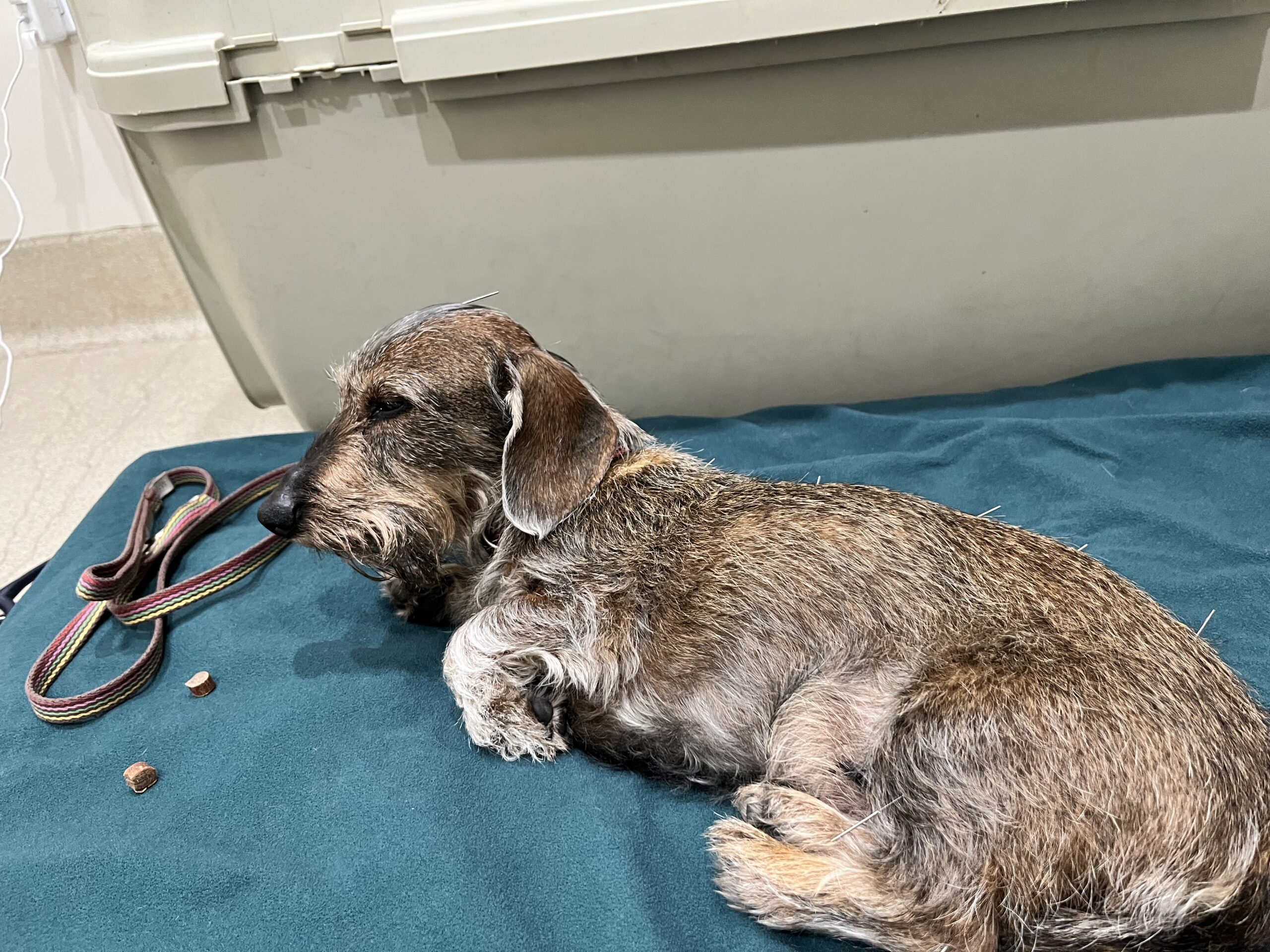Veterinary Services
Coastal Holistic offers a wide range of nonurgent and urgent veterinary services for our patients. For more information on these or other services, please call (650) 355-2810.
Main Focus
Our doctors are licensed veterinarians, which allows us to provide the most modern, non-invasive Western veterinary care with a holistic point-of-view. We like to think this means we have “more tools in our toolbox” when it comes to treating your pet. If needed we can perform diagnostic testing including bloodwork, urine/ fecal analysis, and cytology, and we can also prescribe necessary Western medications. We have a wide network of referral hospitals that we work with if your pet requires additional services.
- High quality medicine
- X-ray
- Ultrasound
- In-house and referral laboratory services
- Dentistry
- Surgery

Acupuncture
Acupuncture is the therapy whereby special solid metal needles are inserted into specific locations in the body (called acupuncture points) to prevent and treat disease. Acupuncture points are arranged in an orderly network of interconnecting meridians, which exist in predictable locations throughout the body. These meridians are connected in a specific order according to how and when the body’s life energy – called Qi (chee) or Ki (kee) – flows through them.


Chiropractic
The bones of the spine and joints are maintained in a specific alignment. The nerves surrounding each joint and vertebral articulation are in constant communication with the central nervous system, brain and organs. When even a subtle change in the alignment occurs, it is called a subluxation. Subluxations affect the nervous system, local muscles, joints and even distant organs, glands and body functions. The method of correcting these subluxations is known as chiropractic therapy or “adjustment.” Chiropractic adjustments can change nervous system input, affect blood flow, and alter hormone and neurotransmitter levels, thereby directly affecting the organs, glands, skin, and joints.
- Herbal Medicine
Herbs have therapeutic qualities that are capable of balancing the emotional, mental and physical states of animals. These remedies do not mask or suppress symptoms, as is the case with many Western veterinary medications; herbs treat the deepest constitutional causes of illness. - Nutrition
Proper nutrition is the best preventative medicine, and the foods our pets eat provide the building blocks for their health, well-being and healing. Accordingly, nutritional counseling is an integral part of our service offering. - Shock Wave
A cutting-edge holistic treatment that utilizes gentle shock waves to stimulate tissue repair and improve blood flow. This non-invasive technique accelerates the natural healing process, providing relief from chronic pain, inflammation, and musculoskeletal conditions, helping your beloved companion regain their vitality and joy.
- Cold Laser
A non-thermal light therapy that promotes cellular regeneration and reduces discomfort. Harnessing the power of light, this holistic approach effectively manages pain, enhances circulation, and speeds up healing, all without the need for invasive procedures.
- Chinese Herbs
Tailored to your pet’s individual needs, these natural remedies restore balance and harmony within the body. From addressing internal imbalances to supporting immune function, our carefully selected Chinese Herbs offer a holistic solution to various health concerns, paving the way for a healthier, happier life.
- Western Herbs
Our expertly curated selection of Western Herbs provides a natural way to complement conventional treatments, addressing a wide range of health issues from digestive problems to anxiety.
- Comprehensive New Puppy/Kitten/Adoption Exams and Consultations
Our compassionate veterinarians understand the unique needs of young pets and newly adopted companions. Through thorough assessments, personalized advice, and preventive strategies, we set your new family member on a path of optimal health, ensuring a smooth transition and fostering a strong bond between you and your furry friend.
Additional Services
Puppy & Kitten Care
Getting your new puppy or kitten off to a healthy start sets the stage for their lives as healthy adults. Regular physical examinations, core and elective vaccinations, fecal testing for parasites, and deworming are all important elements of ensuring good health for your puppy or kitten. Our knowledgeable staff can help your family learn about potty training your pup, performing nail trims on your puppy or kitten, dietary recommendations, and potential health hazards for your new pet.
Spaying and neutering are additional topics to consider; the appropriate age for the timing of sterilization surgery may vary depending upon the species and breed of your pet. You may also want to consider pet health insurance — a great way to get your new little family member off to a good start. Last but not least, you’ll also want to consider whether your new puppy or kitten may need preventives such as monthly heartworm prevention and flea/tick preventives. We realize that adding a new family pet can come with lots of questions… but don’t forget, we’re here to help, so please don’t hesitate to call.
Wellness Care
Preventive veterinary care is the cornerstone of keeping your pet their healthiest so that you and your pet can have more great years together. Since pets age more quickly than people do, it is critical to have regular physical examinations done to assess your pet’s health. During routine preventive exams, your veterinarian will assess:
- Overall Body Condition
- Eyes
- Ears
- Nose
- Mouth
- Throat
- Heart and Lungs
- Abdominal Organs
- Musculoskeletal System
- Neurologic System
- Urogenital System
- Lymph Nodes
- Skin/Coat
When health problems are identified, a medical plan will be outlined to evaluate the problems in depth. If your pet appears to be healthy enough for routine preventive care, your veterinarian will discuss which immunizations are advised, as well as parasite prevention including heartworm disease, intestinal parasites, and ectoparasites (fleas, ticks, etc.). Annual age-appropriate lab tests, testing for heartworm and/or tick-borne diseases, and fecal tests for parasites may also be recommended for your pet. Finally, your pet’s nutrition, diet, and exercise routines can be assessed and optimized to help your pet be in best physical condition for their lifestyle and age. Remember, keeping up with preventive care for your pet is the best way to keep your pet happy and healthy for life.
Senior Pet Care
We love senior pets! Senior pets have special needs and benefit from more regular veterinary visits compared to their younger counterparts. Age-associated conditions include:
- Arthritis
- Dental disease
- Heart disease
- Liver disease
- Kidney disease
- Endocrine disorders
These conditions will start to become more prevalent as your pet gets older. For this reason, we recommend twice-yearly veterinary visits for pets over 7 years of age. Your aging pet may be showing early signs of osteoarthritis such as stiffness after rest or play, difficulty going up or downstairs, and reduced activity. Early intervention with joint supplements and prescription arthritis medications when indicated, along with modified nutrition and exercise plans, can greatly improve your pet’s comfort and mobility. Likewise, performing annual screening lab work on your older pet can help identify early stages of medical problems that might go unrecognized, and progress significantly without treatment.
Some pets experience age-related behavioral changes that can be a sign of cognitive dysfunction, which is similar in some ways to dementia. Your veterinarian can recommend diet modification and supplements to help improve your older pet’s mental sharpness. Getting older doesn’t have to be fraught with troubles for your pet… see your vet regularly to help keep your senior pet healthy and comfortable.
Parasite Control
Pets are a part of our families, and preventing parasite infestations is an important part of keeping them healthy. Both ectoparasites (external parasites) and endoparasites (internal parasites) can affect your pet at some point in their life. Ectoparasites, such as fleas and ticks, are not only a nuisance to your pet, but can transmit vector-borne diseases to humans and pets such as Bartonella (cat scratch disease, transmitted by fleas), Lyme, Anaplasmosis, Ehrlichia, and Rocky Mountain Spotted fever. Fleas can also cause a severe dermatologic condition for your pet resulting in very itchy, inflamed skin, due to flea allergy dermatitis.
Roundworms are the most prevalent endoparasite in pets. Others include hookworms, whipworms, and tapeworms. Pets are typically infected with these parasites through accidental ingestion of parasite eggs (which are microscopic) from areas that have fecal contamination from other infected animals. Alternatively, some parasites are acquired through ingestion of intermediate hosts such as rodents (Taenia tapeworm species; Toxocara roundworm species) or fleas (Dipyllidium tapeworm species). These parasites are also a health risk to humans and are considered zoonotic – meaning they can be transmitted from animals to people. For example, if a person accidentally ingests roundworm eggs, the larvae can migrate into the body and cause organ damage and potentially blindness. Hookworm larvae in the soil and grass can infect bare skin and cause a condition in people known as cutaneous larva migrans.
Heartworm is another important endoparasite, but one which is not zoonotic. Heartworm infections result from pets being bitten by infected mosquitos. The larval form of the heartworm travels through the bloodstream to the heart where it develops into an adult. The adult heartworms live in the right side of the heart and if left untreated, result in progressive heart failure and death. In the initial stages of heartworm disease, pets may be asymptomatic. As the condition progresses, symptoms may evolve including a cough and exercise intolerance in dogs, and vomiting/coughing in cats. Treatment of heartworm disease can be very risky for the pet, and very costly.
Because of the health risk to your family and pets, it is important to keep your pet on a year-round parasite-prevention program. There are several preventives that, when used properly, are very effective at greatly reducing the risk of your pet acquiring heartworm disease, intestinal parasites, and tick-transmitted diseases. Additionally, you can help prevent the risk of zoonotic disease to your family by practicing good hygiene (frequent hand washing), avoiding eating unwashed raw vegetables or undercooked meats, and cleaning up pet feces in your yard. For more information about pets and parasites, visit petsandparasites.org, and consult with one of our friendly staff!
Pet Dental Care
One of the most common but also frequently overlooked health problems for companion animals is dental disease. By age 3, most pets have some degree of periodontal disease. This occurs as a result of bacterial infection along the gum line, due to the formation of plaque. Plaque is a sticky substance containing millions of bacteria that forms along the tooth surface and gum line. Without frequent removal, plaque eventually hardens into tartar. Left untreated, this leads to gradual destruction of the gum tissue and supportive structures around the teeth, which can result in tooth loss. Not only is periodontal disease harmful and painful because it results in loss of teeth, but it can also cause damage to important vital organs such as the:
- Heart
- Liver
- Lungs
- Kidneys
When it comes to dental disease, most pet owners don’t realize the extent of the problem until it is quite advanced; hence the importance of yearly to twice yearly physical examinations including a thorough oral health care assessment. In the early stages of dental disease, your veterinarian can recommend home dental health care measures such as tooth brushing, dental treats and rinses, and dental diets. When professional dental care is needed for your pet, general anesthesia is necessary. Your veterinarian will discuss the procedures involved in a COHAT (comprehensive oral health assessment and treatment) plan with you when dental care is needed. Most often, this will involve a day at the veterinary hospital to plan and perform the procedures, which may include doing:
- Pre-operative lab work
- IV catheterization
- General anesthesia
- Dental X-rays
- Teeth cleaning and polishing
- Dental charting
- Extractions when indicated
Upon discharge, the veterinary team will review any instructions pertaining to post-dental medications, special feeding instructions, and when to resume home dental care. Your pet will thank you for remembering to take care of his or her mouth and live a longer and happier life as a result.
Diagnostic Care
When your pet is sick or injured, they can’t tell us what’s wrong. A thorough physical exam and history (symptoms you’ve noted at home) are the first important steps. If the diagnosis is not immediately evident upon initial assessment, your veterinarian will recommend specific diagnostic tests. These may include:
- Laboratory testing for baseline blood counts and organ function tests, or infectious disease. Blood and/or urine samples may be collected from your pet, for point-of-care testing, or reference lab tests. Point-of-care tests are those tests that are done on-site in our hospital so as to be able to determine results and make treatment recommendations in the most timely fashion possible. In other cases, lab samples may need to be sent off to off-site laboratories (reference laboratories) – when the test cannot be performed with in-hospital lab equipment, or when the test results are not needed urgently.
- Imaging such as X-rays or ultrasound, which allow diagnosis of conditions of the heart and lungs, gastrointestinal obstruction, tumors of the internal organs or bones, fluid in the chest or abdominal cavity, urinary stones or gallstones, reproductive diseases, and bone/joint disorders. For most patients, gentle restraint can be used for these procedures, however, in some cases, sedation may be necessary.
- Microscopy is quite useful in the evaluation of lab samples such as ear swabs, skin impressions and scrapes, and needle biopsies of tumors. These tests are helpful in the diagnosis of dermatologic and otic (ear) conditions.
- Ocular conditions may warrant evaluation for tear production (Schirmer tear test), corneal injuries (fluorescein stain), or abnormal intra-ocular pressures (tonometry).
Diagnostic testing is an important step in the development of a treatment plan for your pet, allowing your veterinarian to most effectively target the underlying problem(s) and assess the probability of successful treatment. Your veterinarian can explain the purpose of each diagnostic test for your pet, and help prioritize which tests may be most helpful in determining the cause of your pet’s illness.
In-House Laboratory
We utilize state-of-the-art laboratory equipment to identify underlying health issues in order to keep our animal companions healthy and happy. When our animal companions are in pain, they cannot tell us where they are hurting. In order to establish what is happening, we perform lab tests to help identify common concerns such as dehydration, anemia, and infection, in addition to more extensive concerns such as kidney disease, liver disease, and pancreatitis.
We are able to perform common labwork and emergency labwork with our in-house equipment. The results are available to our veterinarians within approximately an hour.
Certain labwork can only be performed by an outside laboratory. We utilize Idexx Reference Laboratory for this purpose.
Common labwork sent to Idexx Reference Laboratory:
- Biopsy
- K9 young adult maintenance screening
- Geriatric screening
- Phenobarbitol level
- Fecals
*Depending on sample sent, results are available to our veterinarians in approximately 24-72 hours
Surgery & Related Services
At some point in your pet’s life, they may need a surgical procedure. Whether your pet is having an elective surgery, such as spay or neuter, or an emergency surgery for intestinal obstruction, you can rest assured that our staff will provide the very best care possible for your pet.
Our facility offers the following surgical services for companion animals:
- Routine spay and neuter
- Dentistry
- Tumor removal
- Abdominal and soft tissue procedures
- Orthopedic surgery
- Endoscopy and biopsies
- Laparoscopic surgery
In the best interests of our pet, we require a physical examination appointment with one of our doctors prior to scheduling procedures. Before the procedure is scheduled, our staff will explain the process including:
- Any pre-surgical testing that is recommended — Baseline laboratory testing is beneficial so that there are no surprises on surgery day. Knowing that your pet has normal blood test results can help prevent anesthetic complications or surgical complications such as excessive bleeding, which can occur when patients have low platelet counts or abnormal clotting. When there is liver or kidney disease, this may affect the choices of anesthetic drugs recommended by your veterinarian, to prevent anesthetic complications and promote a smooth anesthetic recovery.
- Food and water intake restrictions prior to surgery — A period of fasting may be necessary prior to your pet’s procedure. Our staff will let you know what is advised.
- What procedures are to be done on the day of surgery — From the initial intake to sedation and general anesthesia, anesthesia monitoring, the procedure, and recovery, the staff will walk you through what will happen with your pet once you leave the hospital.
- Discharge and aftercare for your pet — Many patients are able to go home the same day as their procedure, whereas others may need an overnight stay. The veterinary team will advise you as to what is best for your pet, and also discuss aftercare for your companion and any rechecks needed.
Accessibility
At Coastal Holistic, we take pride in offering pet care that knows no boundaries. Our commitment to accessibility is evident at every step of your visit. With dedicated handicap parking, a wheelchair ramp leading inside, and full ADA compliance, we ensure that every pet parent can experience our exceptional services.
Beyond the physical accommodations, we foster an atmosphere of genuine hospitality. We wholeheartedly welcome individuals with disabilities, ensuring that you and your furry companion receive the care you deserve in an environment that prioritizes comfort.
Join us at Coastal Holistic where ADA compliance is more than a requirement – it’s a promise we uphold to make top-notch veterinary care accessible to all. Discover a place where every pet’s health and every client’s well-being truly matter.

